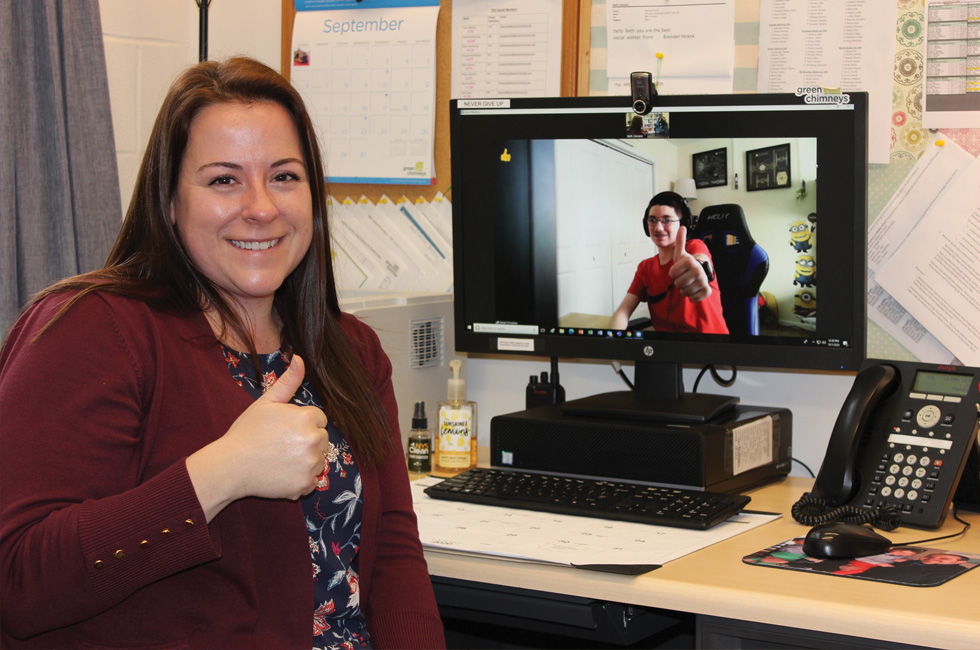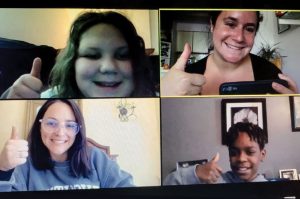Announcements

 A child’s perspective typically depends on their age, and their understanding of events going on in the world around them. When we think about helping children deal with change, we consider age and level of development to help gauge what degree of explanation and support they may need. The psychosocial implications of the pandemic have been far-reaching and few have gone unaffected but what has it meant for Green Chimneys students, children who faced mental and developmental disorders well before COVID-19?
A child’s perspective typically depends on their age, and their understanding of events going on in the world around them. When we think about helping children deal with change, we consider age and level of development to help gauge what degree of explanation and support they may need. The psychosocial implications of the pandemic have been far-reaching and few have gone unaffected but what has it meant for Green Chimneys students, children who faced mental and developmental disorders well before COVID-19?
“There is no common way that people have dealt with the health crisis,” says Dr. Steve Klee, Associate Executive Director for Clinical & Medical Services at Green Chimneys. “It depends on your life situation, access to resources, what mental or emotional struggles you may have. Our students were sent home suddenly and then, along with their family, had to learn a lot of new information, most of which had to be shared remotely.”
Strategic coordination between the school, residential, clinical and student support programs began in February to prepare staff, students and families for the emerging health concern. At the time, no one imagined that it would lead to a complete change in how Green Chimneys delivered its services, and for such a lengthy period.
Director of Social Services Kristin Licardi oversees 21 social workers, mental health counselors, and transition coordinators who provide daily clinical support to Green Chimneys School students and their families. “The social isolation had a tremendous impact on the kids. The specific needs of the population we serve require ongoing support; these kids don’t readily have the coping skills and social-emotional aptitude to navigate a long-term crisis or to be disconnected from the support they’re accustomed to.”

Green Chimneys pivoted quickly to using a variety of platforms to ensure continuity of students’ education and treatment plans. Migrating to virtual clinical treatment, also known as telehealth, was a serious challenge for staff and students but it was imperative. “There are limitations in a virtual setting and it can feel strange not sitting face-to-face but even in a remote session, the focus remains on the existing treatment plan,” says Klee. “It’s vital support that has to happen for the people who need it. Despite children and families being remote, it was critically important to continue to provide mental health services and therapeutic support.”
Regression was fully anticipated by staff; educationally for all students in some form, and those who had progressed emotionally and socially in their treatment were bound to suffer setbacks due to few, or no, opportunities to practice social and developmental skills. Clinicians, occupational therapists and student support teams pressed on with all-virtual sessions to meet students’ regular treatment plans. The clinical team also developed a steady stream of online resources, self-care videos, and virtual support groups to give families additional tools as they became service providers in their own right, now that their child with special needs was at home.
This summer, when New York State permitted special education programs to provide in-person instruction, a portion of Green Chimneys students returned to campus. The start of the fall semester saw about 70% of day and residential students return in person but online clinical treatment continues. Some beneficial outcomes of the past months include knowledge of new tools and increased self-reliance among families, which has led to some students stepping down to a lower level of care, and some students have even returned to their home school district.
“During our campus closure, we offered a wide range of services and support to our families. It was important for us to model flexibility and willingness to make it continue,” says Klee. “The risk of not continuing was simply too great; it would mean rupture to the therapeutic relationship with the child and family, and all the trust that’s been built.”
“It was never an option not to deliver,” says Licardi. “It felt contrary to our mission and purpose. The commitment of our staff, and of our students and families, has never been clearer and we are working in a ‘new normal’ with the benefit of new skill sets – it’s empowering.”
Please consider a year-end gift to Green Chimneys. As we continue to serve the needs of fragile children and their families, your generosity, in any amount, will help maintain therapeutic education and nature-based programs for children who need them.

Crowned the best for falconry in medieval times, gyrfalcons were once reserved for kings. As the largest falcon in the world, with exquisite plumage ranging from bright white to deep charcoal, gyrs are revered for their powerful skill of flight. Their long wings make hunting waterfowl from 3,000-feet-high a feasible and fantastical feat. This falcon was flown in the sport of falconry for several years.